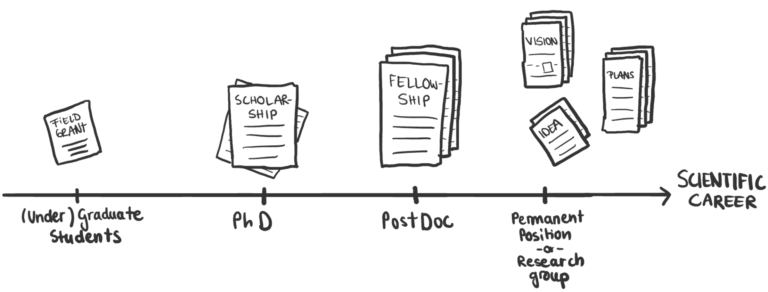Funding
last edited: December 06, 2023
Here we have an incomplete (!) list of scholarships, grants, and other opportunities to seek funding in Germany and abroad. It is a random list for different stages of your academic career for different projects (fieldwork, PhD or PostDoc projects, starting your own group …). That could mean that you are only in part eligible to apply, so please check for yourself for eligibility, deadlines etc.
Disclaimer: We know there is a bias as we don’t cover all regions of the world! Most items are on the list from people talking about their own experiences.
Our list evolved from attending a workshop on Funding Options at EGU2022 and the Early Career workshop of the EU Horizon 2020 project TiPACCs.
At the bottom you can find a section on Commonly asked questions concerning funding.

Please also check out:
- A funding database on the website of APECS International
- This futurerockdoc overview on grants & scholarships
- The scholarship database of the German Academic Exchange Service (DAAD)

To read more about the topic, check out our new publication Nicola, Loebel and Zuhr (2022) in the DGP Journal Polarforschung.
Funding options in Germany
From Germany
- DFG – Deutsche Forschungsgemeinschaft
- DGP Polarforschung
- Leopoldina (PostDoc)
- Hanse-Wissenschaftskolleg Fellowships (≥ PostDoc)
- DAAD scholarship for research stays abroad
- DAAD Research Grants – One-Year and Short-Term Grants
- Stipend by the Christiane Nüsslein-Volhard-Stiftung for young women with children (Doctoral/PostDoc level)
- AXA Post-Doctoral Fellowship
PhD scholarships 🎓
- Foundations: Studienstiftung, Deutsche Umweltstiftung
- Church foundations: Evangelisches Studienwerk Villigst & Cusanus
- Party-affiliated foundations: Konrad-Adenauer, Friedrich-Ebert, Heinrich-Böll and more
- Funding through Graduate schools (depending on where you want to do your PhD): IMPRS (MPI Hamburg), Potsdam Graduate School, POLMAR (AWI)
International
- SCAR Fellowship (Focus: Antarctica, see also our webinar on how to apply)
- CliC Grants
- IAATO Fellowship (Focus: Antarctica)
- CCAMLR Fellowship (Focus: Biology, Antarctica)
- COMNAP Fellowship (Focus: Antarctica)
- National Geographic Society
- Alexander von Humboldt Fellowship (PostDoc Level)
- Walter Benjamin Program (DFG)
- APECS Adrian Dahhood-Fritz Memorial Fund (ECR Travel support for conferences)
- Field Inclusive Research Grant (Fieldwork grant)
Pan-European
- ERC (European Research Council) grants
- Marie Curie Fellowship
- ECORD (Drilling)
- Isaafik (Arctic Gateway)
- ESA Fellowships for Earth Observation, Earth System or Climate Scientists
Funding options within Europe
UK- based
- UKRI Future Leaders
- EDI (Environmental Data Initiative) Fellowship
- NERC (Natural Environment Research Council)
- EPSRC Grant (Engineering)
- Hazel Prichard Student grant
- The Royal Society – University research fellowship or leadership award
- Leverhulme Trust – Early Career Fellowship
- Geological Society of London
Denmark
Norway
- The Research Council of Norway
- Arctic Field Grant (funding for fieldwork)
France
- CNRS
- French Space Agency (focus on remote sensing)
Luxemburg
Belgium
- FNRS funded PostDoc or permanent position
- UCL Louvain
Switzerland
Ireland
Funding options overseas
US
- NASA PostDoctoral Program
- NOAA Climate and Global Change Postdoctoral Fellowship program (anywhere)
- NSF – National Science Foundation (Postdoc only for US citizen or permanent residents)
- Visiting Scholar Programs at the Jet Propulsion Laboratory (NASA)
- Scripps, Ohio State, .. Postdoc fellowships (check local colleges!)
- Fullbright scholarships
Australia
- Australian Research council
Canada
Japan
Stipends by the Japan Society for the Promotion of Science (JSPS):
- JSPS PostdoctoralFellowship (short-term)
- JSPS Postdoctoral Fellowship (6- 24 months)
- JSPS Invitational Fellowship
Commonly asked questions
First, it can be useful to check what you are looking for. Do you search for a post-doctoral position? Do you want your conference stay covered? Do you search for a PhD scholarship?
A good starting point is hopefully our overview on this page or other funding databases. Make sure to subscribe to mailingslists, such as cryolist, to stay informed about new calls or open positions. Being on Twitter or other social media and following scientists in your desired field could help too.
In Germany, there are a few foundations that offer PhD scholarships (see above) to which you can apply for funding. When you have a great idea and a professor who doesn’t have an open position, but would supervise you, you can try your luck there. Applications to these foundations normally entail a grant proposal in which you lay out your project idea, explain the theoretical background and proposed methods, show your relevance of your topic and offer a potential time plan of your PhD project.
Even if you are applying to a grant in e.g. Germany, it does not necessarily mean that your proposal has to be written in German. As the language of (polar) science is English, most applications allow you to write a proposal in English. It however depends where you apply and you should definitely check the requirements before starting your preparations.
The reporting period depends on your project and funding agency. For PhD scholarships you likely have to write a progress report every year to get your funding extended. Some other agencies, such as the DFG, may additionally ask you to participate in a workshop presenting your work to other people. In structured PhD programs you might have a panel meeting every 6 months, but in most cases your funding does not depend on the meetings then.